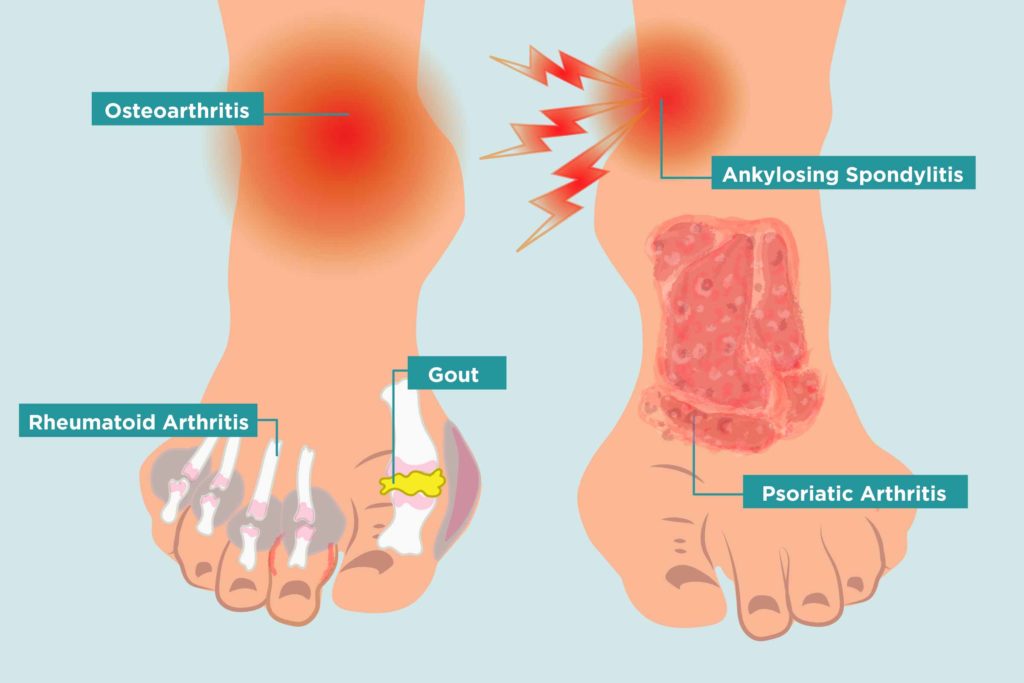Arthritis: What You Need To Know
There are over 100 different types of arthritis – crazy, right? Arthritis can have a significant impact on your joints, your mobility, and your ability to lead an active life. As podiatrists, we work extensively with patients with arthritis to help them feel more comfortable on their feet, so they can stay on their feet and independent.
Today, we’re sharing the five most common types of arthritis we see and how we can help you feel more comfortable on your feet, too.

Osteoarthritis
Osteoarthritis is the wear and tear arthritis. It develops gradually over time, as the cartilage that covers your bone ends wears down. Let’s take the knee joint as an example. When the cartilage covering the ends of the tibia (shin bone) and femur (thigh bone) wear down, they are no longer able to absorb shock and facilitate the smooth, gliding movement of the knee joint. This means the ends of the bones can become damaged and painful, making it uncomfortable to walk and bend the knee.
As osteoarthritis worsens over time, it can also cause bony changes, ultimately leading to a stiff and immobile joint. At its worst, some joints may need replacing once osteoarthritis becomes severe. This is not uncommon for knee joints that are severely affected. For other joints, like in the feet, symptoms can be improved using treatments like orthotics.
Rheumatoid arthritis
Rheumatoid arthritis is an autoimmune disease, meaning that your own immune system mistakenly attacks the lining of your joints. This results in ‘flares’ of the joints, where they become painful, stiff and inflamed. Over time, this can lead to prominent nodules in the joints.
While it is not clear what triggers rheumatoid arthritis, it is thought that your body becomes confused after a bacterial or viral infection. Rheumatoid flare-ups are often symmetrical and tend to affect your feet and hands.
Gout
Gout occurs when you have too much uric acid in your blood, which forms painful crystals in the joints. Often, this develops in the feet, at the big toe. Gout also comes in flares, and can cause sharp pain that makes it difficult to walk and bear weight on the affected joints.
Often, the build-up of uric acid is caused by consuming too much food that contains purines, which turn into uric acid. Other causes include an overproduction of purines from your body, or your kidneys being unable to process the uric acid created by your body.
Psoriatic arthritis
Psoriatic arthritis is a type of arthritis that develops in people that have psoriasis. As psoriasis affects the skin and causes inflammation, in psoriatic arthritis, both the skin and the joints have flare-ups as they are attacked by the body’s immune system.
Like rheumatoid arthritis, the exact cause has not been determined. Genetics are thought to play a role, however, as approximately 40% of people with psoriatic arthritis have a family member with either psoriasis or arthritis. Often, the toes become swollen, with toenails sometimes becoming discoloured or pitted.
Juvenile idiopathic arthritis
Juvenile idiopathic arthritis is the general name given for arthritis that develops before the age of 16. It is also an autoimmune disease, where joints become swollen and tender as a result of the body attacking its own tissues.
Like all other autoimmune arthritides, the cause is poorly understood, but the outlook is positive, with approximately 50% of those affected not continuing to suffer symptoms in adulthood. The symptoms as children, however, can be extremely painful, so require good management and care to help affected children walk and move comfortably.
Managing arthritis
As different people experience different symptoms in their feet and legs with arthritis, our involvement in helping you manage your arthritis starts with the specific symptoms you are experiencing.
Where corns or callus have formed, we can debride and remove these in one appointment. If you are having problems with thick or distorted toenails, we can help trim these, reduce their thickness, and keep them from contributing to any pain.
We believe that knowledge is the key to making the best decisions for your long-term health, so we always provide education and advice around looking after your joints and lower limbs. We can assess your footwear, and recommend shoes that keep you comfortable and promote your mobility.
We often create custom orthotics to offload painful areas in the feet, support the foot and arch, improve comfort, and help our patients feel more confident on their feet.
To book an appointment, call us on (03) 972 2927 or book your appointment online here.
